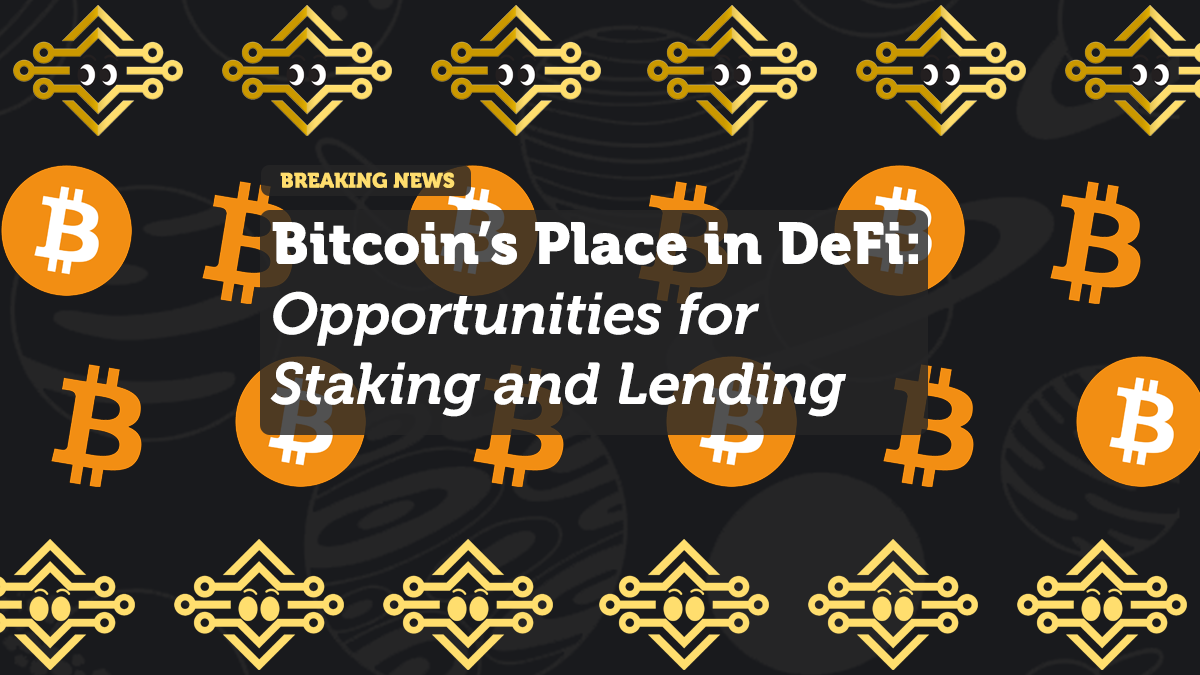
Bitcoin’s Place in DeFi: Opportunities for Staking and Lending
Bitcoin, the world’s first and most widely recognized cryptocurrency, is no longer just a store of value or a means of exchange. With the rise of decentralized finance (DeFi), Bitcoin is being integrated into platforms that enable staking, lending, and other financial activities traditionally associated with the Ethereum blockchain. This integration opens up new financial opportunities for Bitcoin holders, offering them the ability to earn yield, access liquidity, and participate in a growing ecosystem. But as with any financial innovation, these opportunities come with risks and rewards that users need to consider carefully.
Key Platforms Enabling Bitcoin in DeFi
Sovereign: Bringing Bitcoin into DeFi
Sovereign is a leading platform in the Bitcoin DeFi space, enabling BTC holders to participate in decentralized finance without needing to convert their Bitcoin into Ethereum or another asset. By using Bitcoin as collateral, users can engage in activities like lending, borrowing, and trading, all while staying within the Bitcoin ecosystem. Sovereign’s platform is designed to be user-friendly and secure, allowing Bitcoin holders to leverage their assets for additional financial gains without leaving the safety of Bitcoin’s blockchain.
RSK: Smart Contracts on Bitcoin
RSK is another key player in the integration of Bitcoin into DeFi. As a smart contract platform secured by the Bitcoin network, RSK enables the creation of decentralized applications (dApps) that utilize Bitcoin’s security features. By using RSK, developers can build DeFi protocols that offer Bitcoin staking, lending, and other financial services, all while benefiting from the robustness and decentralization of the Bitcoin blockchain. This opens up a new world of possibilities for Bitcoin, transforming it from a passive asset into an active participant in the DeFi economy.
Risks and Rewards of Participating in Bitcoin DeFi
The Rewards: Yield Strategies and Liquidity
One of the main attractions of integrating Bitcoin into DeFi is the potential for yield generation. By staking Bitcoin or using it as collateral, users can earn interest or other rewards, providing a passive income stream. Additionally, Bitcoin DeFi platforms often offer liquidity pools where users can provide liquidity in exchange for a share of transaction fees. These yield strategies can be particularly appealing in a low-interest-rate environment, offering Bitcoin holders a way to grow their assets.
The Risks: Liquidity and Security Concerns
However, participating in Bitcoin DeFi is not without risks. Liquidity can be a double-edged sword—while platforms like Sovereign and RSK aim to provide sufficient liquidity, there is always the risk of illiquidity during times of market stress. Additionally, smart contracts, though powerful, are not infallible. Bugs or vulnerabilities in the code could lead to significant financial losses. Moreover, the interoperability between Bitcoin and other blockchains in DeFi can introduce additional security risks, such as cross-chain vulnerabilities that might not be present in purely Bitcoin or Ethereum ecosystems.
Long-Term Implications for Bitcoin’s Role in DeFi
Expanding Bitcoin’s Utility
The integration of Bitcoin into DeFi has the potential to significantly expand Bitcoin’s utility beyond just being a store of value. By enabling staking, lending, and other financial activities, Bitcoin can play a more active role in the global financial system. This could lead to increased demand for Bitcoin, as users seek to take advantage of the financial opportunities available through DeFi platforms.
Impact on the Broader Financial Ecosystem
As Bitcoin becomes more integrated into DeFi, it could also have a broader impact on the traditional financial system. For one, it could drive further adoption of decentralized financial services, challenging the dominance of centralized banks and financial institutions. Additionally, the integration of Bitcoin into DeFi could lead to more innovative financial products and services, potentially bridging the gap between traditional finance and the burgeoning crypto economy. However, this also raises regulatory questions, as governments and financial authorities may seek to impose new rules on DeFi platforms that integrate Bitcoin, potentially influencing how these platforms operate in the future.
Conclusion
The integration of Bitcoin into DeFi represents a significant evolution in the cryptocurrency space, offering new financial opportunities for Bitcoin holders. Platforms like Sovereign and RSK are leading the charge, enabling users to stake, lend, and earn rewards with their Bitcoin in a decentralized manner. While the rewards can be substantial, it’s important for users to understand the risks involved, particularly in terms of liquidity and security. As Bitcoin continues to play a larger role in DeFi, it could reshape the broader financial ecosystem, paving the way for a more decentralized and innovative future in finance.
















